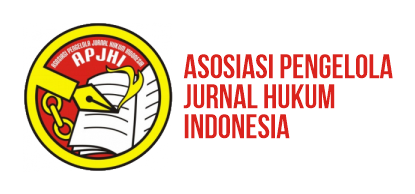APPLICATION OF CRIMINAL SANCTIONS AGAINST CHILDREN AS A PERPETRATORS OF ABUSE THAT CAUSE DEATH FROM THE JUVENILE CRIMINAL JUSTICE SYSTEM PERSPECTIVE
Main Article Content
Novita Lestari*
Tofik Yanuar Chandra
Sanrawan Paparang
The main objective of this study is to describe the application of criminal sanctions against children who commit acts of abuse that result in death, as well as the legal protection from the viewpoint of the Juvenile Criminal Justice System. This study employs a normative juridical legal research research methodology; the technique used in this legal research is statutory, case-based, and conceptual approach. The study's study found that the legal regulation of children who commit violent crimes under the Criminal Code does not reflect an authentic understanding of what constitutes violence. Only in article 89 of the Criminal Code does it indicate that what constitutes committing violence causes individuals to faint or become helpless (weak). Along with Article 89 of the Criminal Code, Article 170 is one of the articles included in Book II on Crime's Chapter V headed "Crimes against Public Order." Consequently, the criminal conduct as defined in Article 170 is first and foremost a criminal act that violates or disturbs public order. Criminal responsibility for children who commit acts of physical violence that result in death is tied to the arrangement in Article 351 paragraph (3) of the Criminal Code, as criminal responsibility is imposed on children when the child is found to have fulfilled the criminal element through an error committed by the child, violence committed by the child, and victims who are victims of physical violence are known to have died at the time or after the physical violence was committed.
Ardani, R. (2018). Penerapan Sanksi Pidana Terhadap Pelaku Tindak Pidana Pembunuhan Yang Dilakukan Oleh Anak Di Yogyakarta.
Assa, A. (2019). Kajian Hukum Tindak Pidana Penganiayaan Berat Oleh Anak Di Bawah Umur. LEX CRIMEN, 8(4).
Gultom, M. (2014). Perlindungan hukum terhadap anak dan perempuan.
Hadjon, P. M., Martosoewignjo, S. S., & Basah, S. (2005). Pengantar hukum administrasi Indonesia.
Hasibuan, A. R. (2016). Penerapan algoritma floyd warshall untuk menentukan jalur terpendek dalam pengiriman barang. JURIKOM (Jurnal Riset Komputer), 3(6).
Hutabarat, D. T. H., Salam, A., Zuwandana, A., al Azmi, C., Wijaya, C. R., Darnita, Tania, I., Lubis, L. K. A., Sitorus, M. A. P., Adawiyah, R., & Sinaga, R. (2022). Analysis Of The Implementation Of Law In Every Level Of Society In Indonesia. Policy, Law, Notary and Regulatory Issues (POLRI), 1(2), 9–14. https://doi.org/https://doi.org/10.55047/polri.v1i2.80
Imaningrum, S. D. (2019). Penafsiran Hukum. Teori dan Metode. Sinar Grafika, Jakarta.
Iqbal, A. R. (2020). Sanksi Pidana Terhadap Pelaku Pembunuhan Yang Dilakukan Oleh Anak Dibawah Umur Menurut Hukum Pidana Anak Di Indonesia (Studi Kasus Putusan Nomor 12/Pid. Sus Anak/2016/PN. Mtr). Universitas Muhammadiyah Mataram.
Iskandar, Umami, A., & Fadilla, D. (2021). Analysis Related To Judges’ Considerations In The Immediate Decision Of Criminal Actions Against Children. Policy, Law, Notary and Regulatory Issues (POLRI), 1(1), 57–64. https://doi.org/https://doi.org/10.55047/polri.v1i1.32
Kamil, A. (2012). Filsafat kebebasan hakim. Jakarta: Kencana.
Marbun, R. (2012). Kamus Hukum Lengkap: mencakup istilah hukum & perundang-undangan terbaru.
Moeljatno, A.-A. H. P. (2008). Penerbit Rineka Cipta. Jakarta.
Novira, M., & Marlina, M. (2013). Kebijakan penanggulangan kejahatan terhadap anak pelaku tindak pidana dari perspektif undang-undang Republik Indonesia Nomor 11 Tahun 2012 tentang sistem peradilan pidana anak. Jurnal Mahupiki, 1(1).
Rahardjo, S. (2009). Penegakan Hukum: Suatu Tinjauan Sosiologis.
Sembiring, A. (2017). Penerapan Sanksi Pidana Terhadap Anak Pelaku Pembunuhan yang Disertai Mutilasi dari Persepektif Hukum Pidana dan Kriminologi (Studi Kasus NO. 774 K/PID. SUS/2015).
Supriadi, S. H. (2019). Etika dan Tanggung Jawab Profesi Hukum di Indonesia. Sinar Grafika.
Waluyadi. (2009). Hukum Perlindungan Anak. Mandar Maju.















